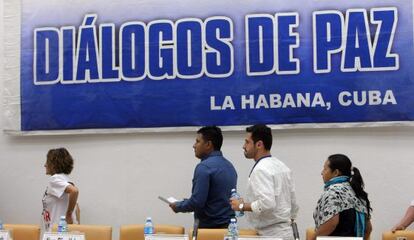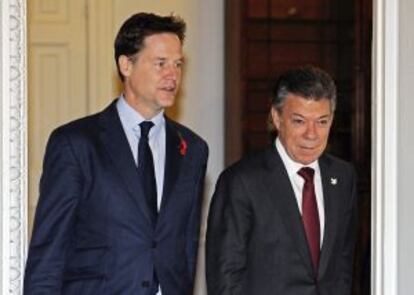Are Colombia’s talks with FARC guerrillas near the end?
President Santos’ European tour and presence of group chiefs in Havana suggest progress

From Madrid to London and Berlin to Brussels, Colombian leader Juan Manuel Santos was heaped with praise and pledges of support during his tour of European capitals last week.
The president was in Europe to secure support for his ongoing negotiations with the FARC guerrillas, a process that has been moving forward for nearly two years.
Santos underscored all the advantages of an end to the conflict, and said that never before had so much progress been made in talks with the rebel group. He also repeated what Britain’s Deputy Prime Minister Nick Clegg said in Spanish during their London meeting: “This could be the last and the only true opportunity to end a conflict that is already 50 years old.”
The war between the guerrillas and the Colombian state has already caused six million displaced people and 220,000 deaths
The war between the guerrillas and the Colombian state has already caused six million displaced people and 220,000 deaths.
Santos, who was re-elected to a second term in June on the back of his talks with the FARC, has been raising expectations and drumming up solid foreign support for a project that several analysts believe has gone far enough to mean that taking it apart would be more costly than completing it.
Even the rhetoric of peace employed by the government has incorporated the term “post-conflict,” in reference to a new period that would open up right after the signature of the agreements in Havana. This post-conflict era would focus on rebuilding the nation and would rely on support from initiatives such as the donor conference that Spain has offered to organize following Santos’ visit to Madrid.
One of the reasons that suggests that the talks are advanced is the fact that a group of the FARC’s operations chiefs traveled to Havana three weeks ago. They were taken there in secret, with authorization from the Colombian government.
“It’s a sign that the guerrilla group has sent over the leaders who control the field to discuss the details of an end to the conflict,” explains María Victoria Llorente, director of Ideas para la paz, a foundation specializing in conflict resolution.

One of these leaders is Henry Castañeda Garzón, aka Romaña, who came up with the sarcastically named “miracle fishing,” a reference to FARC’s indiscriminate kidnappings of the late 1990s.
“He symbolizes everything that citizens repudiate the most about the FARC, and the revelation created a very strained environment in Colombia,” says Llorente. But it is also a sign that the guerrilla has been, until now at least, a compact organization.
Yet observers are not ruling out the possibility that some splinter groups will break away from the group. The risk is greater in “areas where the FARC act as drug traffickers, such as Nariño or north of Cauca Valley... but they would be a minority,” says Javier Ciurlizza, director of Latin American affairs for the non-profit Crisis Group.
There is also some concern regarding mid-level FARC leaders who have no interest in politics but great interest in the money to be made from drugs. That is why Ciurlizza, who was part of the Peru Truth Commission, insists that “it is crucial to create incentives for them, to avoid the danger of an incomplete demobilization as was the case with the paramilitary, some of whom later joined criminal gangs.”
The guerrilla’s admission that it has caused victims — in its own twisted way, it admits to having “affected civilians at various moments...” — is also viewed as a sign that things are moving. Only two years ago, the FARC’s chief negotiator Iván Márquez stated in Oslo that: “Those who must afford reparation to the victims are the killers who remain entrenched in their spurious officialdom.”
The international community’s enthusiasm for the process is in stark contrast with the enormous polarization it has created in Colombia. An October survey by the consultancy Cifras y Conceptos shows that only 39 percent of Colombians believe the talks will be successful, and that an overwhelming 85 percent reject the notion that FARC leaders might not go to prison.
In fact, the more complicated aspects of the negotiation are still up in the air: what truth, reparation and justice the victims of the conflict will receive, whether there will be jail for the guerrilla members or alternative sanctions, and just how demobilization, decommissioning of weapons and return to civilian life will take place.
The international community’s enthusiasm for the process is in contrast with the polarization it created in Colombia
The government also has to deal with the military’s concerns over its future as an institution in a hypothetical peace scenario, and what convictions await individuals who committed serious crimes during the conflict. There are 4,173 members of the army under investigation for summary executions and false positives — passing off killed civilians as guerrilla members — according to a prosecutor’s report quoted by the newspaper El Espectador.
President Santos has said that the army will also be eligible for penal benefits. “It is only fair that if there are legal benefits for the enemies, there will also be legal benefits for our forces,” he said in July.
Adding to the complexity of the process is the powerful opposition exerted by former president and senator Álvaro Uribe. The ferocity with which he keeps attacking the talks has not diminished since June, when the issue became the focus of the presidential campaign.
“It is a matter of concern that peace is considered irreversible because the state has put itself on equal footing with terrorism, generals are being considered the political equals of their killers, and the dominating thesis of the agreements is the totalitarian, well-disguised views of castrochavismo,” he wrote, in a popular joint reference to the policies of Fidel Castro and Hugo Chávez.
It is a matter of concern that peace is considered irreversible because the state has put itself on equal footing with terrorism”
Uribe’s words fell like gasoline onto the highly flammable situation, in which the FARC continues to perpetrate attacks and popular rejection of prison benefits or political participation for FARC members remains as high as ever.
The government is hoping that citizens will accept the agreement once they get a chance to evaluate it in its entirety. Meanwhile, it has taken two years to negotiate three of the six items on the agenda: land reform, dismantling the FARC’s drug-trafficking network, and participation in politics.
Right after his re-election, Santos said that he hoped the talks would end by late 2014, although he warned that this was a personal wish, not a deadline. But his recent European tour feeds the notion that 2015 will be a decisive year.
Tu suscripción se está usando en otro dispositivo
¿Quieres añadir otro usuario a tu suscripción?
Si continúas leyendo en este dispositivo, no se podrá leer en el otro.
FlechaTu suscripción se está usando en otro dispositivo y solo puedes acceder a EL PAÍS desde un dispositivo a la vez.
Si quieres compartir tu cuenta, cambia tu suscripción a la modalidad Premium, así podrás añadir otro usuario. Cada uno accederá con su propia cuenta de email, lo que os permitirá personalizar vuestra experiencia en EL PAÍS.
¿Tienes una suscripción de empresa? Accede aquí para contratar más cuentas.
En el caso de no saber quién está usando tu cuenta, te recomendamos cambiar tu contraseña aquí.
Si decides continuar compartiendo tu cuenta, este mensaje se mostrará en tu dispositivo y en el de la otra persona que está usando tu cuenta de forma indefinida, afectando a tu experiencia de lectura. Puedes consultar aquí los términos y condiciones de la suscripción digital.









































